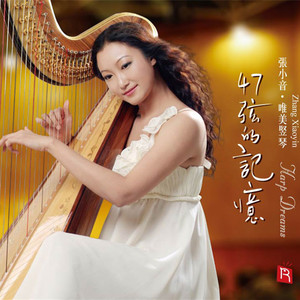
- 歌曲
- 时长
简介
四十七弦的记忆 Harp Dreams 张小音·唯美竖琴 Zhang Xiaoyin·Magic from 47 Strings 那是云的指尖,拨动了天空的涟漪。 将一缕缕金子般的阳光,透过繁密的枝叶,纤细而耀眼地投射到心上。 在水边,我幻想过这一张琴: 无语,如弓,引而不发。 弯曲有致的姿态宛如一段象牙般细腻的颈项,那一颔首的温柔; 雕琢的前柱渐渐缠上了岁月的青藤,琴弦绽出了玉色的花朵。 天上来的光,瀑布一般,洒落成晕。 粼粼的水波,不知是滑动在弦上,还是流动在梦里。 在琴畔,我幻想过这样一个手势: 像微风,轻轻掠过,不惹尘埃。 将岁月分解成和弦,将回忆滑奏出淡然,将那许多心颤的动机,隐秘在四十七弦之间。 一弦一柱思华年…… 或许一生,也可如同这一个手势,不疾不徐,轻轻挥掉些什么,抚平些什么。 竖琴,这种世界上最古老的拨弦乐器,仿佛是来自仙境的精灵,脉脉如诉。在巴洛克背景的歌剧舞台,它奏出行云流水的美妙琶音,又温柔又神秘,将寂寂凡尘点染出天堂的温暖。亨德尔、拉威尔、德彪西、格什温等彪炳史册的音乐大师,都折服于竖琴的迷人魅力,为它创作过许多独奏曲目,巨擘瓦格纳在歌剧宏篇《尼伯龙根的指环》中创造性地使用了六张竖琴,柏辽兹更惊人地将十张竖琴安排在《浮士德的沉沦》中。 比起耀眼的煌煌巨制,温暖轻灵的甜美小品可能更能贴近人们对于竖琴的印象。作为中国首张真正意义上的高品质竖琴音乐大碟,同时也是瑞鸣音乐迄今最为温暖甜美的一张器乐专辑,《47弦的记忆》以十六首中外竖琴曲勾画出一幅幅雅致而温情的动人音画,仿佛十六段诗意盎然的美景如呈眼前: 秀美者如《小河淌水》,将月光下的情深意切描绘得生动如许;端庄者如《天鹅》,竖琴的水波明媚荡漾;《圣母颂》里,琴声从云端洒下银色的圣洁光芒。 甜美者如《欢乐时光》,柔软的布鲁斯令人心醉;《花枝圆舞曲》则将经典芭蕾舞剧的梦幻仙境勾画得芬芳四溢,无限神往。 或者充满思念忧伤的《永隔一江水》和《娜塔莲娜》,将那一种不能言说的刻骨深情,在粼粼如波的竖琴拨弦间心碎地吐露。 来自古巴的《格里斯哈巴涅拉》和哥伦比亚的《美味哥伦比亚》的缠绵拉丁风情异彩夺目,充满了加勒比海的迷人和醇香。 此曲只应天上有 ,人间能得几回闻。惟有站在这一柄竖琴的近前,轻抚那华美辉煌的琴身,才能真切体会到一触之间从琴弦传到心底的万千波澜。也惟有在一个特别的时分,洗濯心灵,才能真切感受这张竖琴音乐带来的愉悦交织感动的温暖情愫。 张小音,这位来自中国爱乐乐团的竖琴演奏家,琴声如同人物一样优美而端庄,将西方乐器的纯美倾诉与中国气质的恬淡娴静水乳交融;一双素手拨动弦上云霞,与一众国手乐师精妙配合,将十六首色彩纷呈的中外名曲浓情演绎。 制作人叶云川特邀永远对作品满怀赤诚的录音大师李大康,在中国解放军军乐团录音棚亲自操刀完全同期录制,精心记录着每个灵感的细节。这位在亚洲录音界享有盛誉的大师,一生录制过无数动人的音乐专辑,此次录音过程中也不由发自肺腑地赞叹:“数十年录音,已习惯在过程中找缺点,这样美的音乐,让我忘记了工作,只有感动。”这一份纯美的感动,又藉由美国著名后期工程师Doug sax的精良后期制作完美收梢,存留这个冬日最暖心的一程音乐偶遇。 也许这人生,风一程雪一程,这样充盈着甜美轻快的时光只是片刻的憩息,或是旅途中不忍醒来的半段恬梦,然而路上的人们,却从不放弃对于那一点温暖的探寻。当天使在云端洒下银色的歌声,不如静泊独坐,低垂眼帘,一璧祈愿,一璧安享。 Foreword: As soft as a feathery cloud floating upon an ocean of sky; As pure as a single golden ray of sunlight penetrating the dense foliage of an ancient forest. Sitting on the bank of a calm lake, I dream about this magical instrument: Silently, it’s body gently curved as a golden bow forever holding its arrow… Gracefully arching its shapely neck, as if a shy, gentle nod to the statuesque carved pillar, its strings falling like precious jade flowers. I close my eyes and hear the sounds of Heaven and waterfalls and sparkling waves… is it the sound of those jade strings or have I fallen into a dream? Sitting on the bank of a calm lake, I dream about playing this magical instrument; Like a gentle breeze passing by, barely stirring the dust. The faint echo of rippling arpeggios stretching through the years, fading slightly, changing with the passing of time – whispered secrets shared between its forty-seven strings. A single tone sounds… and quickly fades away. The harp is one of the world’s most ancient stringed instruments, its pure and angelic voice echoes through the centuries like a voice from some faraway fairyland. From its first appearance on the opera stages in the Baroque, the harp’s mystic tones would accompany gods and kings, evoke the beauties of nature and describe visions of heaven. Handel, Ravel, Debussy, and Gershwin all succumbed to the harp’s myriad charms, providing numerous solos for gifted virtuosos, while other composers envisioned transcendent harp orchestras: Wagner called for six harps in his massive "Ring of Nibelungen" opera cycle, while Berlioz needed ten harps for his légende dramatique, “The Damnation of Faust.” In contrast to the dazzling excesses of Wagner and Berlioz, Zhang Xiaoyin offers an intimate program of delightful sketches from around the world. In this, her first solo recording, Chinese harpist Zhang Xiaoyin’s “Harp Dreams” has drawn together 16 enchanting musical works that give full voice to both her considerable talent as well as presenting the harp as a truly universal instrument. From the elegant beauty of the famous Chinese folk song "Flowing Creek" with its vivid evocation of moonlight shimmering on the water, to the peerless dignity of Saint-Saens’ "The Swan ", and the sublime otherworldly calm of the Bach-Gounod "Ave Maria", Zhang’s harp shimmers as a celestial beam of light. Zhang perfectly conveys the harp’s playful side in pieces such as the ragtime-influenced "Happy Hours” – complete with bluesy slides as well as reminding us that in classical music, the harp is the QUEEN of instruments, as in her magical interpretation of Tchaikovsky’s "Waltz of the Flowers!" She also remembers that the harp was the instrument of choice for generations of minstrel-poets, whose songs of love’s longing and love’s desire is so perfectly expressed in the Chinese folk song "Separated by A River Forever " and the tender "Nataliana." For those fortunate enough to have stood near to a harp while it was being played, or actually touched the strings of a harp themselves understand the magic this instrument can exert upon the human heart. Even an unskilled player can produce beautiful sounds, but in the hands of a master – the beauty washes over you in wave after wave of exquisite sounds. Principal Harpist for the China Philharmonic Orchestra Zhang Xiaoyin embodies the grace and elegance of her chosen instrument – a sophisticated artist with an international reputation as a soloist, chamber music performer and orchestral musician. Her program of 16 colorful works from around the world will be a revelation for many listeners. Her peerless performances have been perfectly captured by China’s preeminent sound engineer Li Dakang, recorded in the spacious studios of the PLA Band with post-production overseen by the legendary Doug Sax at the Mastering Lab in Hollywood, California – for another phenomenal recording from Rhymoi Music! If the heart can be likened to a harp, then each string, and each tone, is a precious feeling to be cherished. If our lives are played upon this celestial harp, may the hand touching our life-strings be ever gentle and kind. If one day, our Harp of Life becomes overgrown with the tendrils of passing years, who will prune back the vines and help us find our song? 竖琴演奏家简介:张小音 5岁起学习钢琴;9岁开始跟随中央音乐学院魏林林老师和左因教授学习竖琴。于1992年考入中央音乐学院附中开始专业学习竖琴演奏,并以优异的成绩多次获得奖学金。1998年被中央音乐学院管弦系录取,于2002毕业并获得竖琴专业大学本科学士学位。 在附中和大学学习期间,学习了广泛的竖琴独奏曲目并多次参加独奏演出。曾为中央电视台录制独奏曲目并经常与中国国家交响乐团等国内专业乐团合作。大学中不仅与中国的乐团合作演出还应邀多次参加莫斯科皇家芭蕾舞团等国外乐团在华的演出。2002年曾跟随中国爱乐乐团出访美国等多个国家演出,,参加演出的国家有:美国、意大利和德国等。 2003年,张小音被英国两所最著名的皇家音乐学院录取,同年以全额奖学金被波士顿音乐学院录取。 2003年秋,选择进入美国波士顿音乐学院攻读音乐硕士学位,师从Ms. Cynthia Price-Glynn,Ms. Ursula Holliger和Hancy Hurrell。在学习中,学院对她优秀的文化课,专业课成绩以及出色的演出高度认可;由于出色表现,她的事例荣幸的被学院刊登在2004年的校刊‘STAGE’中。 在学习的四年中,演奏了大量独奏音乐作品,而且演出了近百场室内乐作品音乐会古典和交响乐。四次考取并获得了在“室内乐荣誉音乐会”上演出的机会;多次与波士顿当地的专业管弦乐团等合作演出;并出色完成了四次个人独奏音乐会。 2005年获得了波士顿音乐学院音乐硕士学位。同年,受波士顿音乐学院管弦系教授Ms. Cynthia Price-Glynn的邀请攻读演奏家学位。 2006年考入中国爱乐乐团,担任竖琴演奏员至今。多年以来,演奏了国内外各个时期作曲家的经典作品,并为广播、影视录制音乐,获得了业内外的广泛赞誉。 录音师简介: 李大康 中国传媒大学影视艺术学院教授、一级录音师、中国录音师协会理事。 青少年时期学过琴、插过队、当过兵。1976年从部队复员到中国唱片社,开始从事录音工作。工作后又在北京广播学院录音艺术专业进修,是国内最早从事立体声及环绕声的录音师之一,曾任中国唱片总公司录音技术部主任。2003年调入北京广播学院(现中国传媒大学),担任教学与科研工作。 从事录音工作三十多年,以认真负责、严谨细致的工作作风和全面扎实的录音技术以及丰富的录音实践经验著称,与国内外众多优秀艺术团体及艺术名家合作,录制了一千多个片号的节目,并形成了自然、纯朴、细腻的音响风格。其中数十个作品获得国内和国际不同奖项。主要获奖作品有电视片《说凤阳》音乐获81优秀电视片奖;箜篌与箫组曲《清明上河图》获亚广联87年会“放送基金大奖”;《台湾幻想曲》获法国“戛纳”96唱片展大奖;参与录音创作的舞剧《白鹿额娘》获中宣部“五个一工程”奖;《金色庆典》获“2006年度十大发烧唱片” 奖及“最佳录音”奖。其它有影响的作品有李谷一、成方圆、彭丽媛、宋祖英等歌唱家和马思聪、李焕之、瞿希贤等老一辈作曲家以及谭盾、郭文景等中青年作曲家的专辑;《黄河大合唱》;小提琴协奏曲《梁祝》;钢琴协奏曲《黄河》;刘明源等民乐大师的专辑;梅葆玖专辑《梅韵》;军乐团礼仪音乐《辉煌时刻》;澳门中乐团《澳门情怀》;国家大剧院版歌剧 《图兰朵》;电影《南京大屠杀》、电视剧《共和国往事》、大型电视记录片《邓小平》等音乐。曾主持录制数届文化部春节晚会及新年、新春音乐会等上百场文艺演出,以及《欢庆香港回归》等数十次党和国家重大庆典活动的大型文艺演出。 2004年在“第一届亚洲录音艺术与科学文化节”荣获“杰出贡献奖”。 2008年获第六届“中国金唱片奖”录音奖。 2009年荣获“北京市优秀教师”称号。 2010年荣获“北京市高等学校教学名师奖” 。 演奏成员: 竖琴:张小音 长笛:倪一珍 单簧管:樊巍 双簧管:谢红亮 萨克斯:杜银鲛 大提琴:杨长缨 低音提琴:张小笛 男声:靳锐 女声合唱:王馨悦 刘辉阳 李菁 打击乐:王悦 制作成员: 出品人:叶云川 制作人:叶云川 录音:李大康 录音助理:董克 杨杰 曲璐 中文文案:杨倩 英文文案:Cheek Joshua 制作统筹: 市场统筹:刘军、张威 人物摄影:润冰 摄影:小叶 设计:图图设计工作室 录音棚:中国解放军军乐团录音棚 后期制作:THE MASTERING LAB (USA)

